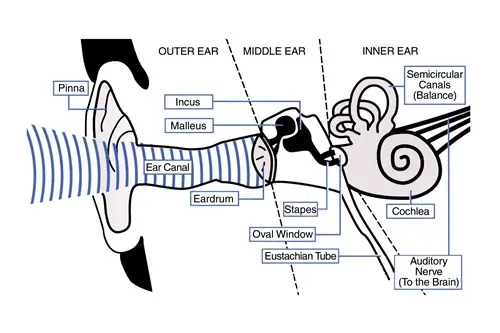By: Matthew Wallace

Story at-a-glance
- Deafness is severe or complete hearing loss, often requiring sign language for communication; hearing impairment ranges from mild to severe.
- Hearing loss can be conductive, sensorineural, or mixed, depending on where the problem occurs in the ear.
- Noise exposure, infections, injuries, age, and genetics are leading causes of hearing loss, some preventable and others not.
- Prevention includes reducing noise exposure, treating infections, avoiding ear trauma, and ensuring children are immunized.
- Early detection is key—many children and adults miss important communication without even knowing they have a hearing impairment.
Deafness and hearing impairment are terms that are frequently used interchangeably. While they are both forms of hearing loss, they have their differences. When a person is deaf, he or she has a severe and profound loss of hearing, and will typically rely on sign language to communicate. A person who is hearing impaired has a loss of hearing that ranges from mild to severe and from temporary to permanent. When a person’s child, family member, or even his or herself is diagnosed with having a hearing impairment, the fear of no longer being able to hear is not uncommon. Fortunately for people who are interested in learning, there is much information to help alleviate fears and help them better understand hearing loss.
Types of Hearing Impairment
When a person has a hearing impairment, it is either one of two primary types or it may be a combination. These types are determined by the location of the problem that is causing the hearing loss or impairment. One type is called conductive hearing impairment, or it may also be referred to as conductive hearing loss. If a person has this type of hearing loss, it is caused by a problem that originates in the outer or the middle ear. When a person’s hearing impairment is the result of a problem taking place in the inner ear, it is known as a sensorineural hearing impairment or loss. There is a third hearing loss type in which a person suffers from a combination of the first two types of hearing loss. This is known as mixed hearing loss. The type of impairment that a person suffers from will also determine whether any form of medical treatment is possible. A person with sensorineural hearing loss has a permanent loss of hearing that cannot be treated by medical means. If a person has this type of hearing loss, he or she may wear a hearing aid to assist with hearing. When a person has conductive hearing loss, it may be medically treated.
Causes of Deafness and Hearing Impairment
There are numerous factors that can cause deafness or a hearing impairment. One of the most well-known factors is sound, such as what comes from repetitive exposure to certain types of machinery, loud music or even the noise from riding the subway. Other factors that may result in hearing loss may come from illness, such as an ear infection, meningitis, chicken pox, or measles. A maternal infection, illness or other complication during pregnancy or birth may result in a loss of hearing that is present from the time a child is born. This is known as congenital hearing loss. Congenital impairments are also frequently caused by genetics. Head trauma and injuries to the ear can cause permanent or temporary hearing loss. Finally, there is the deterioration of one’s hearing as a result of age.
Prevention
Ear impairment is not always preventable, particularly in cases where the cause is genetic or hereditary. In other instances, people can take certain preventative steps to reduce the likelihood of losing their hearing. Avoiding loud noise is one simple way to protect one’s ears. Wearing ear plugs or other head protection is advised when working with noisy equipment or dealing with loud noises. People should also avoid listening to music too loudly whether they are wearing headsets or listening to music at home or in their vehicles. Having children properly immunized can help their bodies fight potential diseases that may lead to hearing loss. Seeking medical treatment for infections and other concerns involving the ears is also helpful. Injury may be prevented by refraining from putting objects, such as cotton swabs, in the ears.
Key Facts
When educating oneself on hearing impairments, there are key facts that everyone should know. These facts will help people better understand hearing impairment, as well as the global and domestic needs of the hearing impaired, and may even help them to prevent it. One of the key facts to know is that early detection can help successfully treat a significant number of hearing loss cases. Another important fact is that simple preventative measures can cut cases of hearing impairment by half. Unfortunately, certain preventative measures, such as those that involve medical care, are not available to many across the globe. Eighty percent of people with hearing impairment that is moderate to severe are from countries that are traditionally low or middle-income. Even hearing devices are not readily available for people in less affluent and developing countries. According to the World Health Organization, less than one in every 40 people who are in need of a hearing aid has access to one.
In the United States, 36 million adults have some type of hearing impairment. There are 1.3 million children younger than three years old who have hearing loss. Fifteen percent of children between the ages of 6 and 19 have some form of hearing impairment. When undetected, treated or assisted by a hearing device, a child with even mild hearing impairment can miss up to 50 percent of what is said in his or her school classroom. Between the ages of 45 and 64, 14 percent of people suffer some form of hearing loss or impairment and roughly 30 to 40 percent of people over 65.
Resources
- March of Dimes: Birth Defects – Hearing Impairment
- Hearing Impairment
- CDC: Types of Hearing Loss
- TeensHealth: What is Hearing Impairment
- Hearing Impairment, Deafness
- Cleveland Clinic: Hearing Impairment and Deafness
- Common Causes of Hearing Impairment in Seniors
- Preventing Hearing Impairment
- WebMD Hearing Loss Prevention
- World Health Organization: Deafness and Hearing Impairment Key Facts
- Center for Hearing and Communication: Facts About Hearing Loss
- Hearing Loss Association of America: Basic Facts About Hearing Loss
FAQs
What is the difference between deafness and hearing impairment?
Deafness is a profound hearing loss that typically requires sign language. Hearing impairment ranges from mild to severe and may be temporary or permanent.
What are the types of hearing impairment?
There are three types: conductive (outer or middle ear), sensorineural (inner ear), and mixed (a combination of both).
What causes hearing loss?
Causes include loud noise exposure, infections, head trauma, aging, congenital issues, and genetic conditions.
Can hearing loss be prevented?
Not all cases are preventable, but steps like avoiding loud sounds, using ear protection, treating infections, and avoiding inserting objects in the ears can help.
How common is hearing impairment?
In the U.S., 36 million adults and 1.3 million children under 3 have hearing loss. Globally, 80% of moderate-to-severe cases are in lower-income countries.
Ready to protect your future?
Get a personalized side-by-side policy comparison of the leading disability insurance companies from an independent insurance broker.




